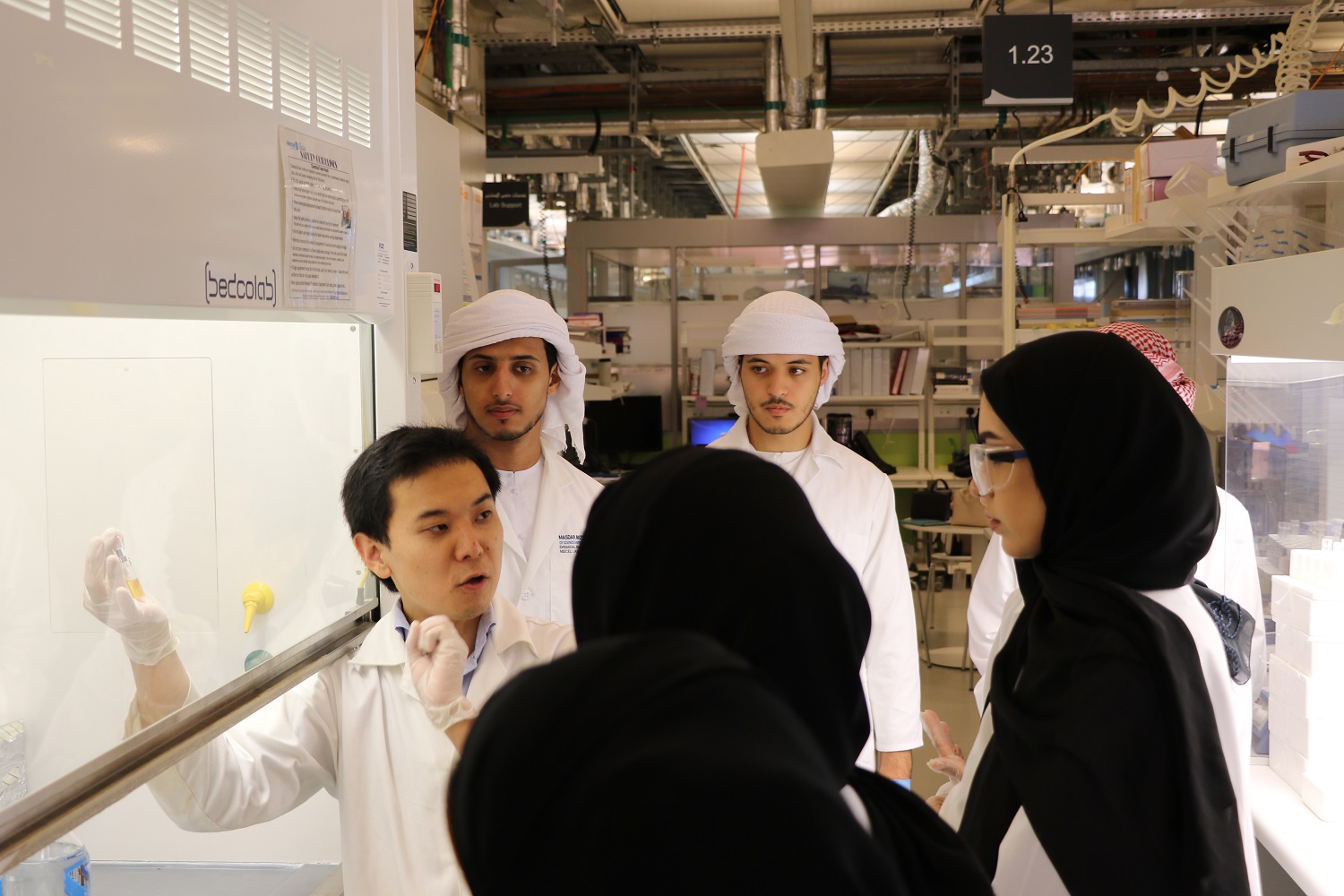
A total of 19 UAE national undergraduates engaged in scientific exploration at the research laboratories of Masdar Institute of Science and Technology as part of the Ektashif Summer 2016 program from 24-28 July.
The on-campus program offered undergraduates majoring in science, engineering or information technology an opportunity to experience the advanced technology environment at Masdar Institute’s cutting-edge laboratory facilities. Nominated by their respective universities, the students participated in many exciting hands-on workshops and discussed on-going research conducted by faculty and current graduate students at Masdar Institute.
Dr. Lamya Fawwaz, Vice President for Institutional Advancement and Public Affairs, Masdar Institute, said: “The twice-yearly Ektashif program provides undergraduate participants a preview of what they can expect if they decide to become part of the Masdar Institute campus community for their Master’s studies. As a research-oriented institution, our Ektashif program aims to raise awareness among young students about challenges and opportunities in energy, space systems, water, sustainable technology, and advanced materials. We believe Ektashif participants take home lessons that will not only change their lifestyles but also encourage them to participate in the UAE’s sustainable knowledge economy transformation.”
The Ektashif workshops this year focused on digital electronics, basic principles of an aerated microbial wastewater treatment bioreactor, as well as application of biotechnology tools and engineering principles for energy, climate change, and health applications. Other technology-focused workshops focused on the role of solid sorbents in carbon capture, practical applications of nano-satellites, applications of power electronics, theories and principles of 3D printing, as well as conversion of waste into added-value products.
The residential internship program is coordinated by Dr. Kenneth Volk, Outreach Manager, Masdar Institute. A policy-focused workshop guided the interns on the design of sustainable energy policy for complex energy economic systems and the financial strategies to promote clean tech investment. A final workshop was designed to help the students learn how to write an abstract for a thesis or journal article and educate them on ways to avoid the pitfalls of plagiarism through proper use of citations.
Dr. Jorge Rodriguez, Associate Professor, Chemical and Environmental Engineering, hosted a lab on ‘Microbial Catalysis Reactor – Water Treatment’, for the Ektashif participants. He said: “This year’s participants were a diverse group predominantly female students, which shows the growing role of women in science and technology in the UAE. Many of the students have chemical and chemical engineering backgrounds and have shown great potential for careers in that field that could benefit the UAE.”
The workshop on satellite communications was hosted by Dr. Prashanth Marpu, Assistant Professor, Water and Environmental Engineering. Dr. Marpu said: “The students were intensely involved in the workshop activity. It was rewarding to see how curious they were about various aspects of satellite communication and CubeSat development at the YahSat Space Lab.”
Ektashif participant Suhaib Mohamed Dawood Abdalla from UAE University, said: “We have had a fantastic journey at Masdar Institute. I learned many things from each class, including the one on CubeSat, which I loved, as well as the digital electronics lab. I am grateful to the faculty and lab staff for listening to us patiently and guiding us through the sessions. And I am definitely looking forward to fulfil my dream of getting accepted by Masdar Institute for Master’s studies.”
Another Ektashif participant Aaya Kamel Mohamed Hasan Almarzooqi from Sharjah Higher Colleges of Technology said: “I had great experience in the labs but the satellite communication workshop was the one I liked most. I have a passion for the space field and the experiment taught us how to track a satellite and how things work when trying to build one. In addition, the workshops on algae, CO2 capture and 3D printer were also amazing. I am grateful to the professors answering all my questions, explaining in a way that I could easily understand.”
The Ektashif Summer 2016 program was further enriched by a research presentation on carbon capture offered by Chemical and Environmental Engineering student Roghayeh Dejan. This research is focused on identifying novel organic solvents for carbon capture that are lower cost than current water-based carbon capture solvents. .
The Ektashif program also seeks to encourage students to consider conducting further research in clean energy and sustainability, while developing the students’ teamwork and communications skills through team building and interactive activities.
Clarence Michael
News Writer
10/08/2016